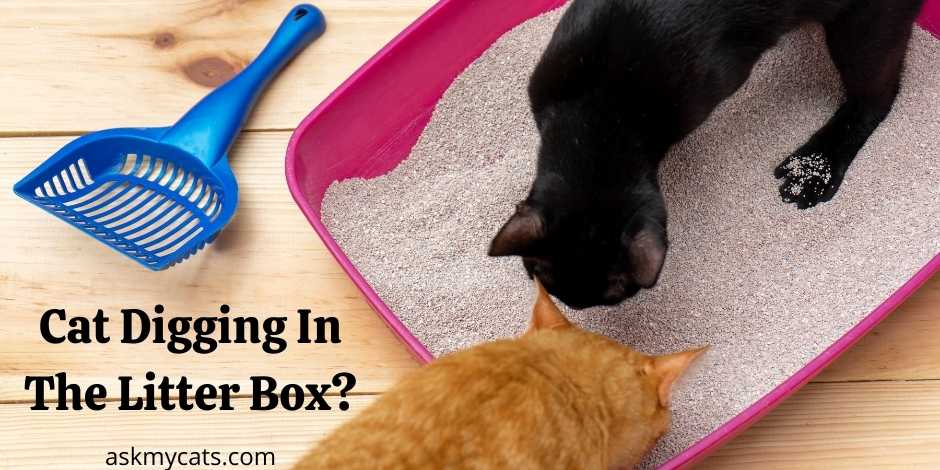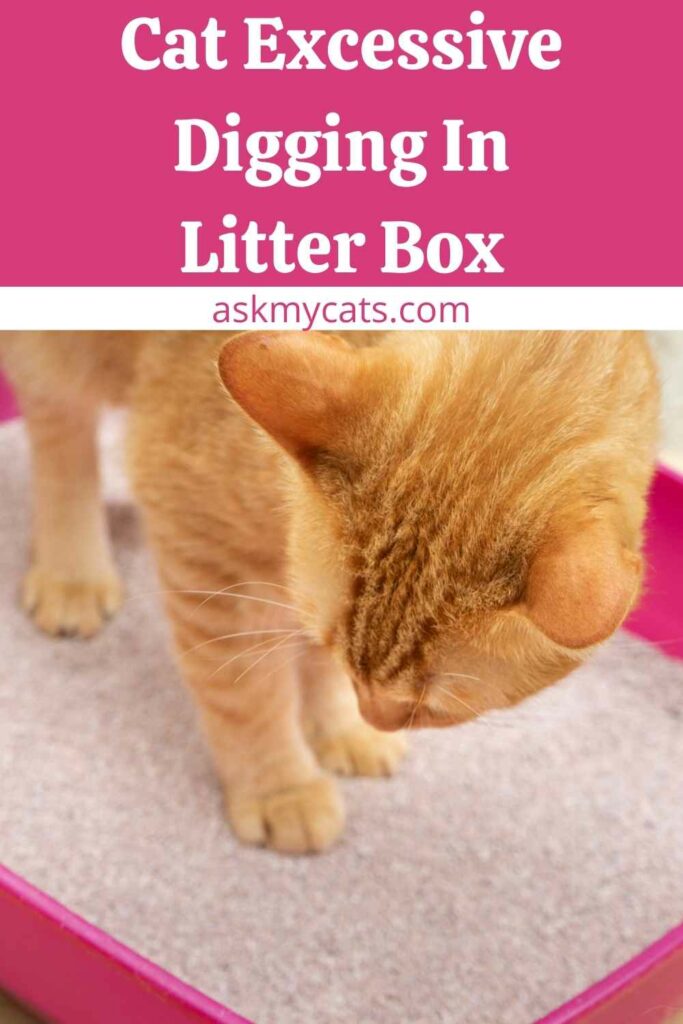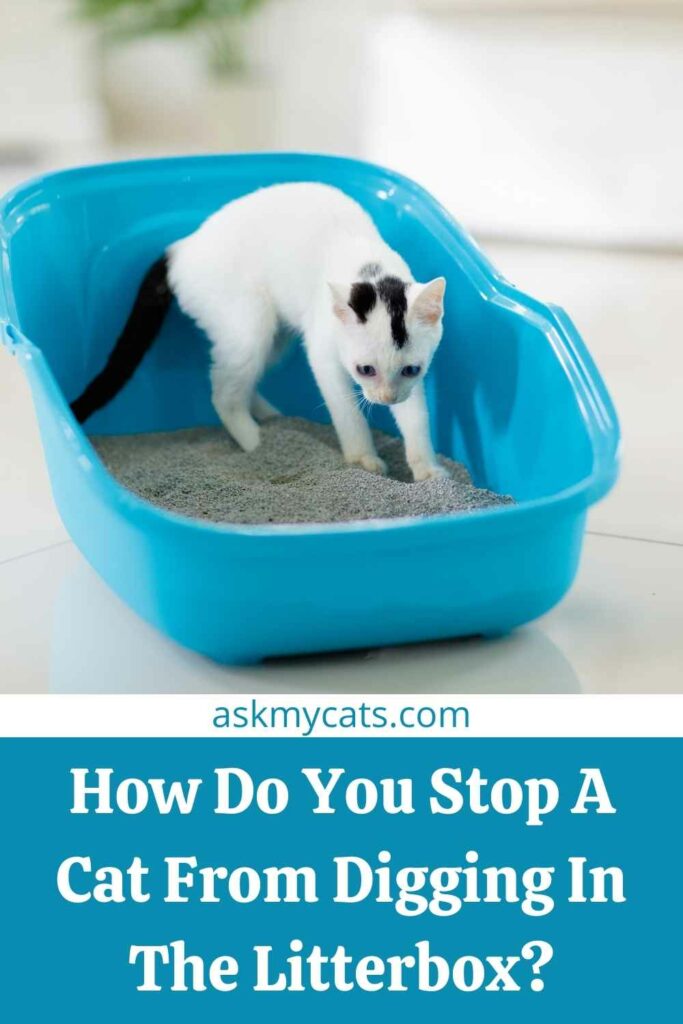If you own a cat, you’re certainly acquainted with the sounds that indicate it’s time for your feline to go potty.
However, the apparently never-ending digging and scuffling, as well as their capacity to send a tidal wave of cat litter flying across the room, may be aggravating and unpleasant, especially if you have visitors.
Your cat may dig the litter box excessively as a result of stress, health difficulties such as gastrointestinal illness, or instincts. He might potentially be doing it because he doesn’t have enough litter or the litter box is too small for him.
A cat digging in the litter box excessively is odd, and you may be wondering why she is doing so, especially at night. Aside from the obnoxious scratching noises, a significant amount of debris is strewn about.


Give Your Cat the Perfect Day
Get the Free Ebook!
Cat Excessive Digging In Litter Box
If your cat begins scratching and digging in their litter box incessantly, it might indicate a health problem or dissatisfaction with the present litter box layout!

Stress, bladder stones, or infection can cause inflammation of the bladder wall. It’s necessary to send your cat to the veterinarian if he or she is digging a lot but not passing much pee.
If your cat is going to the litter box often but not generating any pee, this is a medical emergency, and you should seek guidance from the nearest open veterinarian clinic as soon as possible.
If your cat is suffering from diarrhea and you are unable to improve your litter box cleaning routine, you may notice that they are digging excessively. This is because they are seeking a clean place to sleep and are having difficulty finding one.
If you have many cats that use a litter box, the rivalry for territory may motivate them to scratch, dig, or roll more to leave their smell and mark their area.
If your cat doesn’t believe there is enough litter in the litter box to completely bury their feces, they may dig and scratch excessively in search of more litter.
If your cat doesn’t have enough room in the litter box to feel comfortable doing their business, they’ll dig around a lot to improve the situation!
If your cat is scratching the litter box excessively, she might be suffering from a health problem. Diarrhea and gastrointestinal problems are two of the most prevalent causes.
If your cat has certain health issues, she will spend more time in her litter box. However, if your cat is often urinating or constipated, see your veterinarian right away because these are indicators of renal failure.
Stress and anxiety might be triggered by changes in your house or the cat’s regular routine. Because her typical patterns have been disrupted, your cat may be clawing and excavating her litter box excessively.
It might be as simple as new furniture, or you could have a new pet or family member living with you.
Also, find out why does my cat scratch the side of the litter box
Make careful to figure out what’s stressing her out and assist her cope by providing secure hiding spots. Spend at least a few minutes each day with your cat and participate in playfulness with her.
Above all, respect her “me time” and give her the freedom to engage with you on her own terms.
Cats have an innate survival drive to bury their food and excrement in order to avoid being tracked by predators and adversaries. This might be the cause of your cat scratching her litter box excessively. This might indicate that she is in danger.
Your cat may possibly be overly excavating the litter box to indicate her territory. Cats are territorial creatures with a strong desire to protect their area. Excessive digging might be a cat’s approach to marking her territory by rubbing and marking her smell.
A cat’s favorite place is the litter box, which they see as their playground where they may kick, roll, and disperse litter whenever they want.
Excessive digging might be due to their proclivity to play in their litter box and expand their playground. Consider purchasing a larger litter box for your cat, such as the Petmate Litter Pan.
It’s possible that you’re not putting enough litter in her box, which is why she’s digging so much. Although three inches of litter is suggested, cat experts say that a maximum of four inches is preferable, especially if your cat is a deep scratcher.
Alos, check out why does my cat scratch the floor after using the litter box
Cat Digging In Litterbox At Night
Digging in the litter box at night is a common occurrence throughout cats’ lives. Cats dig a little before going to the bathroom and then perform the rest of the digging afterward to bury their pee or feces.
They do this not just to keep themselves clean, but also to avoid attracting competing animals or predators with the aroma of their feces.
Scratching, rolling, and digging in the litter box can turn into a game at times. Young kittens and cats, in general, may appear to use their litter box to play rather than pass pee or excrement.
Your cat’s fragrance is left in their litter pan every time they roll and scratch, so this activity may also serve as a way for them to mark their territory.
Also, find out why does my cat play in the litter box
Cat Meowing And Digging In Litterbox
When a cat meows while digging in the litter box, it might indicate that they are in discomfort.
We’ll look at the reasons why your cat meows when it’s time to go to the litter box, as well as what to look out for to determine whether there’s a problem.
It might also be a symptom of stress or simply a habit developed by a very noisy cat.
Because pain during urinating might be a sign of a medical problem, if your cat starts meowing when using the litter box, take it seriously and consult your veterinarian right once.
As a means of communication, cats generally meow or cry. The pitch of your cat’s meow, as well as other symptoms, are solid indicators of what they’re trying to tell you while they’re using the litter box.
Cat Digging In Litterbox Not Peeing
If your cat is digging in the litterbox but not peeing it means that your cat’s urethra has been blocked.
A complete blockage of the urethra is a very uncommon ailment that can affect male cats. Every cat owner should be aware of this since it can be fatal if it occurs. As the name implies, the tiny pipe leading from the cat’s bladder gets clogged, preventing urine from passing.
Urine is full of unwanted elements that the body wants to eliminate. When a cat is unable to pee, those chemicals are unable to leave the body and their levels grow. This is a medical emergency since it will kill a cat in a slow and agonizing death within hours.
The urinary system or even the bladder of a cat can become inflamed at times. The tissue is red, painful, and swollen, yet you can’t see it with your own eyes.
The most common cause is a bacterial infection. This illness can be uncomfortable for your cat, and he or she may scream out in agony when urinating.
Interesting Read: Why Is My Cat Sleeping Next To A Litter Box?
Pregnant Cat Digging In Litterbox
Pregnant cats dig in the litterbox to make a safe place for their kitten before giving birth.
Pregnant cats begin hunting for a nest approximately a week before their kittens are due to be born. Prepare a kittening box for her so she may give birth to and feed her kittens in a peaceful, safe environment.
This will absorb moisture and provide something for Mama Cat to dig or scratch.
How Do You Stop A Cat From Digging In The Litterbox?
You should make sure that your cat’s litter box is big enough, that there’s plenty of cat litter in it, and that you’re using their favorite litter. Also, remember to clean it on a regular basis!

At the very least, you’ll know that the time your cat spends scratching and digging about is totally required if you follow these procedures.
First and foremost, it’s critical to know that this is typical feline behavior. You’ll never be able to completely stop it.
Remember that if your cat spends more time in the litterbox than usual, it might be an indication of cystitis, diarrhea, stress, or another health problem, so see your veterinarian if you’re worried.
There are, however, actions you can take to ensure that your kitten uses their litter box as efficiently as possible. Make sure you have adequate litter boxes for your cats – one tray more than the number of cats is preferable.
Scents and aromas are extremely important to cats. This is true not just in terms of their sleeping and eating areas, but also in terms of their personal space.
When cats notice odd scents in their litter box, they can scratch excessively or refuse to use it. As a result, keep the litter box clean at all times.
You might also try using a different type of litter in the litter box. There are many alternatives to pick from but avoid the perfumed varieties. You can also choose environmentally friendly choices.
An uncovered litter box might also help to reduce your cat’s obsessive digging. While a covered litter box is a fine alternative, some cats are put off by the enclosed enclosure, which might lead to digging.
Frequently Asked Questions
Why is my cat digging in the litter box so much?
Cats dig in their litter pan to bury their urine and feces, as well as to have fun and establish their territory. It’s quite normal, but keep an eye out for any changes in your cat’s litter box habit that might indicate a medical issue.
Why is my cat digging the floor?
Scratching the floor around a litter box might indicate that the cat is unhappy with the litter box itself. It’s possible that it’s filthy, too tiny, or that there isn’t enough litter in the box.
Why is my cat scratching the floor around his food?
Pawing or scratching around the meal is not dangerous. It’s part of your cat’s nature to be secure and mask her existence from other predators. In fact, some cat owners find such behavior to be endearing. So, if this is your situation, feel free to let your cat alone and allow her to scratch.
Final Words
Cats enjoy their litter boxes, which serve as a little retreat for them. However, if they detect something strange, such as scents or insufficient litter, they scratch or dig excessively. Whatever the case may be, keep an eye on your cat’s peculiar behavior and attempt to figure out what caused it.
Keep her litter box clean to make it a pleasant location for her. You might also want to try obtaining a larger box and switching litter types.
Leave your questions in the comments section below.
